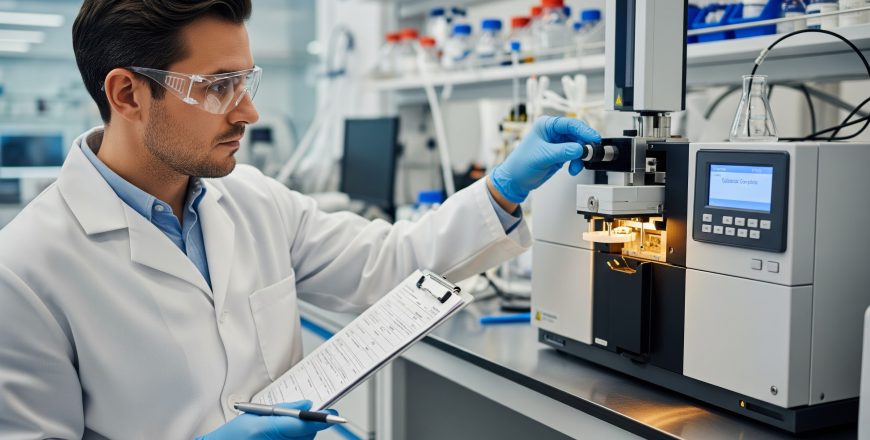Gas and Liquid Chromatography & Troubleshooting Training Nov 24th -27th
- Description
- Reviews
Course Overview
This 4-day course provides a solid and practical grounding in Gas Chromatography (GC) and Liquid Chromatography (LC), combining essential theory with hands-on troubleshooting skills. Participants will explore how both techniques operate, their system components, separation principles, method development, and troubleshooting strategies.
The course also focuses on real-world laboratory challenges, including sample preparation, calibration, system maintenance, and quality control. By integrating GC and LC fundamentals with applied problem-solving, participants will gain the competence needed to improve analytical reliability and optimize chromatographic performance.
Course Objectives
By the end of this course, participants will be able to:
-
Understand the principles of gas and liquid chromatography and their analytical importance.
-
Identify key components of GC and LC systems and understand their functions.
-
Recognize when GC or LC is the appropriate technique for specific analytical tasks.
-
Apply correct sample preparation methods to ensure high-quality chromatographic results.
-
Comprehend chromatographic separation theory, including retention, selectivity, and resolution.
-
Develop and optimize chromatographic methods for various applications.
-
Perform calibration and quantification using accepted analytical standards.
-
Troubleshoot common issues in both GC and LC systems.
-
Implement preventive maintenance and quality control procedures in chromatographic operations.
Target Audience
This course is ideal for:
-
Laboratory analysts, chemists, and technicians who work with GC or LC.
-
Quality control and quality assurance personnel involved in analytical testing.
-
Researchers involved in method development and validation.
-
Professionals in petrochemicals, pharmaceuticals, food safety, environmental analysis, and forensic science.
-
Laboratory supervisors and managers overseeing chromatographic workflows.
Daily Agenda
Day One: Introduction & Fundamentals of Chromatography
-
Overview of gas and liquid chromatography techniques.
-
History and development of chromatographic methods.
-
Principles of separation and retention.
-
Importance of chromatography in analytical chemistry and modern industries.
-
Introduction to stationary phases, mobile phases, and selectivity.
Day Two: Gas Chromatography (GC) Theory & Operation
-
Basic principles of gas chromatography.
-
Components of a GC system: injectors, columns, detectors.
-
Packed vs capillary columns and their applications.
-
Types of GC detectors: FID, TCD, MS.
-
Sample introduction techniques and the role of proper injection.
-
GC method development: flow rate, oven programming, and optimizing separation.
Day Three: Liquid Chromatography (LC) Theory & Operation
-
Basic principles of liquid chromatography.
-
LC components: pump, injector, column, detector.
-
Types of LC columns: reverse phase, normal phase, ion exchange.
-
Mobile phases and gradient vs isocratic operation.
-
Common LC detectors: UV-Vis, fluorescence, RI, conductivity.
-
LC method development: mobile phase composition, flow rate, and column selection.
Day Four: Troubleshooting, Calibration & Practical Applications
-
Calibration techniques in chromatography: external, internal, standard addition.
-
Quantification using peak area and peak height.
-
Troubleshooting GC: injector issues, column problems, detector drift, contamination.
-
Troubleshooting LC: pressure fluctuations, pump issues, peak tailing, baseline instability.
-
Preventive maintenance for GC and LC systems.
-
Quality control practices, SOPs, system suitability testing.
-
Applications of GC and LC in petrochemicals, pharmaceuticals, food, environmental testing, and research.
-
Course review, Q&A, and wrap-up.
Why Choose This Course?
This course provides a balanced combination of foundational knowledge and practical skills, giving participants the ability to confidently operate, maintain, and troubleshoot both GC and LC systems. With real-world applications and method development guidance, the training equips professionals to improve laboratory performance, enhance data accuracy, and solve analytical challenges effectively.
Learning Outcomes
Upon successful completion of the course, participants will be able to:
-
Understand and apply the principles of both gas and liquid chromatography.
-
Select suitable columns, detectors, and operating conditions for various analyses.
-
Develop and optimize chromatographic methods.
-
Perform accurate calibration and quantification.
-
Diagnose and resolve common GC and LC issues.
-
Apply preventive maintenance and quality control procedures to ensure reliable analytical results.






